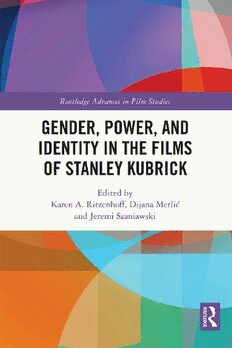
Gender, Power, and Identity in the Films of Stanley Kubrick PDF
Preview Gender, Power, and Identity in the Films of Stanley Kubrick
“To anyone interested in re-reading Kubrick’s films through the lens of contemporary sensibilities, this anthology is essential: with perceptive, varied, and even conflicting results, its essays are thought-provoking and prove that Kubrick’s work is still very much alive.” Filippo Ulivieri, screenwriter; leading expert on Stanley Kubrick’s cinema in Italy “Ritzenhoff, Metlic ́and Szaniawski marshal an eye-opening reappraisal of Stanley Kubrick’s films by trading the dominant narrative of auteur- ism for a focus on Kubrick’s “others.” Armed with great disciplinary range, the chapters investigate Kubrick’s representations of women, racialized people, children, the elderly, of queerness, Jewishness, phal- licism, patriarchy, and misogyny. This is essential reading on the films and their engagement with tropes of western sexual politics, race, and global capitalism.” Kate McQuiston, Professor of Music, The University of Hawaiʻi at Mānoa “Frequently provocative and contrarian this expertly curated collection of essays stimulates a reassessment—if not revision—of core themes, motifs and conventions that undergirds Kubrick’s cinematic art. There is plenty here to challenge and confront the most ardent of Kubrick fans and scholars. Highly recommended.” Mick Broderick, Curtin and RMIT Universities, Australia, author of Reconstructing Kubrick (2017), editor of Post-Kubrick (2017) and The Kubrick Legacy (2019) Gender, Power, and Identity in the Films of Stanley Kubrick This volume features a set of thought-provoking and long overdue approaches to situating Stanley Kubrick’s films in contemporary debates around gender, race, and age—with a focus on women’s representations. Offering new historical and critical perspectives on Kubrick’s cinema, the book asks how his work should be viewed bearing in mind issues of gender equality, sexual harassment, and abuse. The authors tackle issues such as Kubrick’s at times questionable relationships with his actresses and former wives; the dynamics of power, misogyny, and miscegenation in his films; and auteur “apologism,” among others. The selections delineate these complex contours of Kubrick’s work by drawing on archival sources, engaging in close readings of specific films, and exploring Kubrick through unorthodox vantage points. With an interdisciplinary scope and social justice-centered focus, this book offers new perspectives on a well-established area of study. It will appeal to scholars and upper-level students of film studies, media studies, gender studies, and visual culture, as well as to fans of the director inter- ested in revisiting his work from a new perspective. Karen A. Ritzenhoff is Professor in the Department of Communication at Central Connecticut State University, USA. Dijana Metlić is Associate Professor of Art History at the Academy of Arts, University of Novi Sad, Republic of Serbia. Jeremi Szaniawski is Assistant Professor of Comparative Literature and Film Studies at the University of Massachusetts Amherst, USA. Routledge Advances in Film Studies Love in Contemporary Cinema Audiences and Representations of Romance Benjamín de la Pava Vélez Horror Franchise Cinema Edited by Mark McKenna and William Proctor Philosophical Theories of Political Cinema Angelo Emanuele Cioffi Breaking Down Joker Violence, Loneliness, Tragedy Edited by Sean Redmond Film, Environment, Comedy Eco-Comedies on the Big Screen Robin L Murray and Joseph K. Heumann Space and Time in African Cinema and Cine-scapes Kenneth W. Harrow Decline and Reimagination in Cinematic New York Cortland Rankin Digital Space and Embodiment in Contemporary Cinema Screening Composite Spaces Jennifer Kirby Emotion Pictures Movies and Feelings Lucy Fischer Gender, Power, and Identity in the Films of Stanley Kubrick Edited by Karen A. Ritzenhoff, Dijana Metlić, and Jeremi Szaniawski Gender, Power, and Identity in the Films of Stanley Kubrick Edited by Karen A. Ritzenhoff, Dijana Metli and Jeremi Szaniawski ć First published 2023 by Routledge 4 Park Square, Milton Park, Abingdon, Oxon OX14 4RN and by Routledge 605 Third Avenue, New York, NY 10158 Routledge is an imprint of the Taylor & Francis Group, an informa business © 2023 selection and editorial matter, Karen A. Ritzenhoff, Dijana Metlic ́and Jeremi Szaniawski; individual chapters, the contributors The right of Karen A. Ritzenhoff, Dijana Metlic ́and Jeremi Szaniawski to be identified as the authors of the editorial material, and of the authors for their individual chapters, has been asserted in accordance with sections 77 and 78 of the Copyright, Designs and Patents Act 1988. All rights reserved. No part of this book may be reprinted or reproduced or utilised in any form or by any electronic, mechanical, or other means, now known or hereafter invented, including photocopying and recording, or in any information storage or retrieval system, without permission in writing from the publishers. Trademark notice: Product or corporate names may be trademarks or registered trademarks, and are used only for identification and explanation without intent to infringe. British Library Cataloguing-in-Publication Data A catalogue record for this book is available from the British Library ISBN: 978-1-032-07222-7 (hbk) ISBN: 978-1-032-07659-1 (pbk) ISBN: 978-1-003-20817-4 (ebk) DOI: 10.4324/9781003208174 Typeset in Baskerville by SPi Technologies India Pvt Ltd (Straive) For my daughter Lea-Karoline Karen A. Ritzenhoff To my mother—my friend and guide Dijana Metlić To Carolina—my (un)faithful companion Jeremi Szaniawski Contents List of Figures xi List of Contributors xiii Introduction 1 KAREN A. RITZENHOFF, DIJANA METLIĆ AND JEREMI SZANIAWSKI 1 The Problems with Lolita (1962) 17 JAMES FENWICK 2 Sue Lyon and the Consequences of the “Lolita Look” 32 DIJANA METLIĆ AND KAREN A. RITZENHOFF 3 The Legacy of Spartacus (1960) in the Depiction of Ancient Slavery On-Screen: Draba and His Heirs 51 CLAIRE GREENHALGH 4 From Female Stereotypes to Women with Agency: Elite Women and Slave Women in Howard Fast’s 1951 Novel, Spartacus (1960), and Starz Spartacus (2010–13) 67 AMANDA POTTER 5 Fear and Desire, Casual Misogyny, and 1950s Art House Cinema 86 CYNTHIA BARON 6 The Shining and UK Feminist Activism 103 HANNAH HAMAD 7 Mothers Trapped between Law, Economy, Society, and Desire 118 ELISA PEZZOTTA
